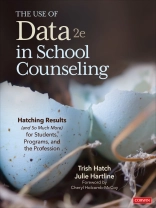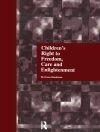Turn random acts of school counseling into definitive and data-driven efforts!
In this new edition of a bestseller, school counseling scholar and advocate Trish Hatch and National School Counselor of the Year Julie Hartline provide school counselors with new ways for moving from reactive to proactive and from random to intentional counseling. By using data to determine what all students deserve to receive and when some students need more, readers will learn effective ways to provide proactive school counseling services, hold themselves accountable, and advocate for systemic change. Inside you’ll find:
- Clear and straightforward directions for analyzing data, planning and providing interventions, and evaluating your work
- Strategies for using data to drive interventions, develop curriculum scope and sequence, create action plans and pre- and post-tests, initiate systems changes, and report results
- Methods aligned with the most recent edition of the ASCA National Model (2019), ASCA Professional Standards and Competencies, Evidence-Based Practice, Multi-Tiered Systems of Support (MTSS), and Multi-Tiered Multi-Domain Systems of Support (MTMDSS)
- New practitioner examples and artifacts, including a RAMP School of Distinction Flashlight Package, plus dozens of tools, templates, surveys, action plans, and data management forms
Equip yourself to think and plan differently, and become more efficient and effective by using data to drive your school counseling program!
Inhaltsverzeichnis
Foreword
Acknowledgments
About the Authors
Learning Targets
Introduction
Chapter 1. Implementing School Counseling Programs for All Students
Standards-Based Education
School Counseling Standards
The ASCA National Model
An Introduction to Multi-Tiered System of Supports (MTSS)
An Introduction to Multi-Tiered, Multi-Domain System of Supports (MTMDSS)
Tier 1 of MTMDSS for School Counselors
Chapter 2. Intentional School Counseling for Students Who Need More
What Is Intentional School Counseling?
Intentional School Counseling and the ASCA National Model
Intentional School Counseling (Tiers 2 & 3) Within MTMDSS
Intentional School Counseling and Evidence-Based Practices
Dropout Prevention and Intentional School Counseling
Chapter 3. The Use of Data to Drive Interventions
School Counselor Data Proficiency
Types of Data
Disaggregation of Data
Setting Reasonable, Measurable Outcome Goals
Federal Grants Call for Even More Data-Driven Decision Making
Chapter 4. Program Evaluation: Using Data to Evaluate Interventions
Process (Participation) Data: What You Did for Whom
Perception (Mindsets and Behaviors) Data: Did You ASK?
Outcome Data: So What?
Hatching Results Conceptual Diagrams
Changes in Data Over Time
Disaggregating Data
Chapter 5. Action Plans: A Two-Pronged Approach
School Counseling Curriculum: Every Student Gets Every Thing
Guidelines for Using Tier 1 School Counseling Curriculum Action Plans
Sample Tier 1 School Counseling Curriculum Action Plans
Intentional School Counseling: Some Kids Need More
Guidelines for Using Intentional Tier 2 School Counseling Action Plans
Sample Intentional Tier 2 School Counseling Action Plans
Chapter 6. Determining School Counseling Curriculum and Interventions
The Art and Science of School Counseling
Research on Non-Cognitive Factors Impacting Achievement
Evidence-Based Approaches
Data-Driven School Counseling Curriculum Decisions
Family Programs and Activities to Support Curriculum
Data-Driven Intentional School Counseling Intervention Decisions
Using Surveys and Finding the Root Cause
Providing Interventions and Curriculum
Chapter 7. Creating Pre-/Posttests
Why Assess? “We Are Teachers, Too”
A-S-K (ASK Them What They Learned)
Attitude: How Is an Attitude Question Created?
Knowledge: How Is a Knowledge Question Created?
Skills: How Is a Skills Question Created?
Beginning Ideas for Pre-/Posttests
Common Questions About Pre-/Posttests
Hints for Creating and Administering Pre-/Posttests
Analyzing and Improving Pre-/Posttests
Final Thoughts on Pre-/Posttests
Chapter 8. Intentional School Counseling for Systems Change
Defining Terminologies and the Work of Systemic Change
School Counselors as Social Justice Advocates
Conducting Data Conversations
Advocating for Systems Change
Intentional School Counseling Action Plans for Systems Change
Activity: Scenarios to Discuss
Chapter 9. Finding (Making) Time: Setting Priorities
Time and Choices
The Annual Administrative Conference
Student Appointment Requests
Calendars
Administrator Check-In Tool
School Counselor Meetings and Sacred Collegial Talk Time
Ratios and Time
Staying in Our Lane: Effective Collaboration With Other Student Services Personnel
FAQs and Time Suckers
School Counseling Program Organizational Questionnaire
Creating a School Counseling Program Handbook
Final Thoughts—Nice Counselor Syndrome
Chapter 10. Reporting Results
Program Evaluation Versus Research
Why Results Reports?
Filling Out the Results Report
Impact Over Time
Calculating Percentages
Creating Graphic Representations of Data
A Common Mistake/Pitfall
Chapter 11. Reporting Results via the Flashlight Approach
The Flashlight Approach: Measuring One Thing—Well
Flashlight Slide Deck Template and a Detailed Walk-Through of a Presentation
Other Optional Flashlight Presentation Slides
Flashlight Rating Scale Rubric
Flashlight One Pagers
Sharing Flashlights
Chapter 12. Flashlight Packages: Putting It All Together
Flashlight Packages Introduction
Program Evaluation Reflection
School Counseling Curriculum Flashlight Package
Intentional School Counseling Flashlight Package
Reflections by Felipe Zañartu
Summary
Chapter 13. Today’s School Counselor Does Make a Difference
Logic Model for Success
Preparing the Soil
Realistic Evaluation (Activity) Questions
Owners or Renters?
Professional School Counselors
Pilots, Passengers, Prisoners, and Hijackers (P3H)
Thoughts on Complex Resistance
Seeing Obstacles as Opportunities
Resolving (Avoiding) the Bermuda Triangle
Using Data Does Make a Difference
Some Final Words From Trish
Some Final Words From Julie
Final Thoughts
References
Index
Über den Autor
Julie Hartline, Ed D is the co-author of The Use of Data in School Counseling: Hatching Results for Students, Programs, and the Profession, Second Edition (2021). In 1988, Dr. Hartline graduated from Agnes Scott College, a liberal arts school for women that nurtures and empowers female leaders. She entered the field of education in 1991 after serving as a parole officer in Atlanta, Georgia and discovering that over 85% of her caseload had not completed high school. She wanted to be a proactive part of the solution and reach young people before they made life-altering choices so she entered the field of education. After teaching for seven years, she found her true calling as a school counselor. Hired as department chair for her first school counseling role, Dr. Hartline held that position for 14 years at Campbell High School where her department became the first high school in Georgia and the first school in her district of 116 schools to receive the Recognized ASCA Model Program (RAMP) award from the American School Counselor Association (ASCA) in 2008. Her efforts to design and implement a comprehensive, data-driven school counseling program were recognized even further when she became nationally recognized as the 2009 ASCA School Counselor of the Year. Dr. Hartline served on the board of the Cobb County School Counselor Association from 2008 to 2013, assuming the role of president in 2009-2010. She also served on the leadership team of the Georgia School Counselor Association (GSCA) beginning in 2009, holding the position of GSCA President in 2014-2015. From 2009 to 2017, she was actively involved in changing Georgia legislation, certification, and policy impacting school counseling, including the creation of a statewide school counselor evaluation tool. She collaborated with the Southern Regional Education Board to design school counselor training modules on college and career access and to advise stakeholders regarding policy implementation. She was also involved in First Lady Michelle Obama’s Reach Higher Initiative, attending the first three White House Convenings and the Obamas’ College Opportunity Day of Action, representing Georgia’s Reach Higher Team. Additionally, she served as an ASCA RAMP Reviewer from 2008 to 2012, reading and scoring RAMP applications from school counseling programs around the nation, and then as an ASCA Lead RAMP Reviewer, overseeing the process of reviewers scoring RAMP applications, from 2012 to present. In 2011, Dr. Hartline earned her doctorate in Professional Counseling and Supervision with her dissertation, “Training School Counselors to Close the Achievement Gap.‘ The following year, she became the School Counseling Consultant for the Cobb County School District where she helped to supervise approximately 300 school counselors in implementing comprehensive, data-driven school counseling programs. She held this role for five years, coaching and supporting over 30 schools through the RAMP process before retiring from K-12 education in Georgia and moving to Florida to teach future school counselors as a Clinical Assistant Professor at the University of North Florida. Having started her work with Hatching Results, LLC in 2013 as a Professional Development Specialist for Hatching Results, Dr. Hartline transitioned to a more dedicated role with the company as the Associate Director of Professional Development in the fall of 2020. She has trained and educated school counselors, administrators and educational leaders around the nation via in-person professional development, webinars, conference sessions, and more. She is passionate about the field of school counseling and the difference comprehensive school counseling programs make in the lives of students.












